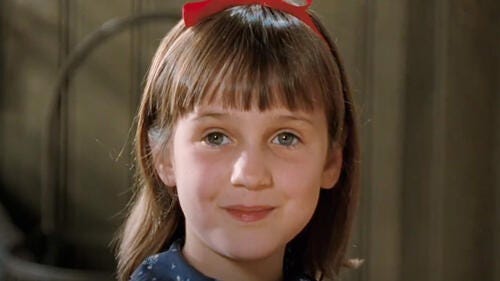Hello, readers and friends!
Hypothetically, let’s say you were in fifth grade and were recently assigned a project by your teacher. This project is to write a short essay every month about a different mathematician or scientist. You think, “Cool, there are SO many people I could choose from.” Then you receive a sheet with pre-selected scientists and mathematicians for each month, and 👏 they 👏 are 👏 all 👏 male 👏 .
I wish I could say this was an actual hypothetical scenario from decades past, but it happened to one of the readers of this Substack in the year of our lord 2024.
In honor, more like horror, of that incident, we are learning about the Matilda Effect.
No, not this Matilda….

Or these Matildas…

The Matilda Effect
The Matilda Effect is a term coined by Margaret Rossiter referring to the systematic suppression of female scientists’ work and crediting female scientists’ work to their male colleagues. It is named for Matilda Joslyn Gage, a suffragette, activist, and sociologist. Quick note: Our girl Matilda was the good kind of suffragette who was against slavery and discrimination against Native Americans. In 1870, Matilda wrote a pamphlet called Women as an Inventor, which detailed that women were smart and capable inventors and provided several examples of female inventors. Controversially, she claimed the cotton gin was NOT invented by Eli Whitney but by Catherine Greene! But that is a story for another newsletter. 😉 She also discussed that women faced many barriers to becoming inventors, including societal pressures and disapproval, leading women to either suppress their talents or patent their inventions under their husbands’ names to avoid ridicule.
About a century later, Margaret Rossiter discovered Gage’s pamphlet and wrote an essay titled The Matthew Matilda Effect in Science. Thus, this phenomenon had a name!
Let’s come back to the definition of the Matilda Effect. We’ll start with the suppression part. First, many women weren’t allowed to be scientists back in the day (probably because they thought we were all 🧙♀️ if we had brains). Women weren’t accepted into or allowed in science programs, which meant they couldn’t have careers in science or join science societies. Some broke through the mold (Marie Curie), but most female scientists from before the 1900s are unknown compared to their male counterparts.
Additionally, when there are a few female scientists, there are even fewer female historians of science documenting the achievements of women in science. So, even when there were female scientists, they rarely made it into history books or other historical documents, meaning their stories died out with each passing generation. It’s a real chicken and egg clusterfuck… or maybe it’s a clustercluck.
If you weren’t enraged enough reading this, let’s throw some feminist lighter fluid on your fire and talk about some examples of female scientists being erased from history.
💫 Cecilia Payne-Gaposchkin discovered that stars weren’t made of Earth (like most scientists believed) but were made of tons of hydrogen and helium. Henry Russell, director of the Princeton Observatory, had to approve her paper on her theory before it could be published. He told her that her conclusion was wrong. Four years later, Russell determined the same conclusion as Payne-Gaposchkin through a different medium. He published a paper of his findings and included a small note on her work but gave her no credit for the discovery.
🧬 Rosalind Franklin’s work was critical to understanding DNA. But who got all the credit after building on her work and not appropriately crediting her? Watson and Crick.
These are only two examples, but there are sadly many others. I mean, for Christ’s sake, they literally named a movie HIDDEN FIGURES about Katherine Johnson, Dorothy Vaughan, and Mary Jackson’s contributions to NASA during the Space Race.
So now you’re probably like… okay, Kate, thanks for thoroughly depressing me at 8 AM on a Wednesday! But fear not! There are ways to combat the Matilda effect!
👩🏫 Teach your friends, family, students, kiddos about the important contributions of women in science! The more we talk about and recognize women in STEM, the more normalized it becomes!
🧐 Do your due diligence! When you come across a scientific discovery or invention, do some digging to see if there’s an untold story, and highlight that story in your findings.
🧪 Support women and girls in STEM! It’s proven that young girls struggle to “be what they can’t see.” They need to know there are women in science and they can have successful, fulfilling careers.
Alrighty, that’s all for this week! See you next Wednesday!
Citations
https://blogs.loc.gov/inside_adams/2020/03/matilda-effect/
https://www.lostwomenofscience.org/news-events/the-matilda-effect-how-women-are-becoming-invisible-in-science
https://en.wikipedia.org/wiki/Matilda_Joslyn_Gage
https://www.ebsco.com/research-starters/womens-studies-and-feminism/matilda-effect



Loved learning that there's a name associated with this phenomenon!